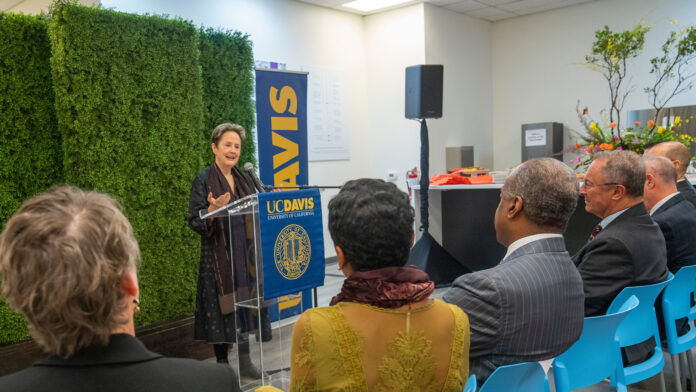Institute to take inspiration from Water’s Berkeley-based Edible Schoolyard Project
UC Davis Chancellor Gary May, Sacramento Mayor Darrell Steinberg and renowned chef, author and food activist Alice Waters announced the Alice Waters Institute for Edible Education during a press conference in Sacramento on Jan. 16. The institute will be a part of Aggie Square — an “innovation center” and partnership between UC Davis and the City of Sacramento that recently began construction.
In order to increase access to healthy, sustainable and equitable food systems in Sacramento and beyond, the institute will conduct research, hold trainings and connect experts from across a variety of disciplines.
At the press conference, May said the Institute is an extension of UC Davis’ commitment to the issue of sustainable agricultural practices and food insecurity.
“We advance research, policy and best practices for agriculture that is healthy, sustainable and accessible to our communities,” May said. “Now we’re taking another great step in our evolution.”
This collaboration follows Waters’ widespread success in her Berkeley-based Edible Schoolyard Project which engages students through hands-on experiences in the garden, kitchen and cafeteria, while also providing free and sustainable school lunches for every student.
The project also empowers other educators to create similar programs in other parts of the country. As the program approaches its 25th anniversary, there are now nearly 6,000 member programs in the network.
“One of [the project’s] key goals is to provide free, sustainable lunch to all K-12 students in California,” May said. “UC Davis will help advance this mission and do even more. Together we can transform the wellbeing of our communities, our food systems and our planet.”
At the press conference, Waters highlighted the widespread effect that this project will have on the community.
“All the vegetables that are grown regeneratively and organically — I can’t believe that they have the possibility of repairing our broken immune systems,” Waters said. “And, at the same time, they’re addressing climate change. I’ve never really thought about this in any political way because I always thought that we could win people over with taste.”
In addition to the social, environmental and health benefits seen in The Edible Schoolyard Project, Waters also said cooking food from different cultures can connect students to the world history and current events being taught in the classroom.
“That’s what we hope to do at the institute: to have a space that is so engaging, so beautiful — irresistible, I dare say — that you all of a sudden absorb the values of stewardship, nourishment and community,” Waters said. “That is really what we’ve lost and can so easily find again.”
Waters concluded with an aspirational statement of what this institute can accomplish: “I just know that this relationship with the University of California is going to lift these values to the moon [and] give them the kind of credibility that only a great university can do,” she said.
Steinberg referenced the history of the project, saying that an institute of this kind was merely a dream as of recent.
Steinberg also looked toward the future, saying the beauty of this institute — and of building a modern food economy — lies in “actually beginning to build those career pathways for young people who are the next Alice Waters, the next entrepreneurs or the next leaders in agriculture.”
“To connect this project to the neighborhoods south and north of here where our kids hunger not just for good nutrition, but hunger for every opportunity to live the dreams they deserve to live as well — this is an incredible moment for my city, for our city,” Steinberg said.
UC Davis Provost Ralph Hexter also spoke at the event, praising the collaboration between UC Davis and Waters.
“Alice and UC Davis have been Northern California neighbors pursuing complementary programs with respect to food for some time,” Hexter said. “I regard The Alice Waters Initiative for Edible Education as a rare and extraordinarily promising opportunity for Alice and for UC Davis to pool our strengths for the benefits of the people in our entire planet.”
Written by: Jessica Baggott — campus@theaggie.org




